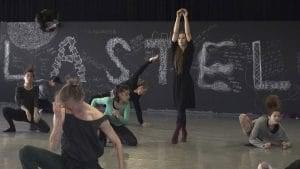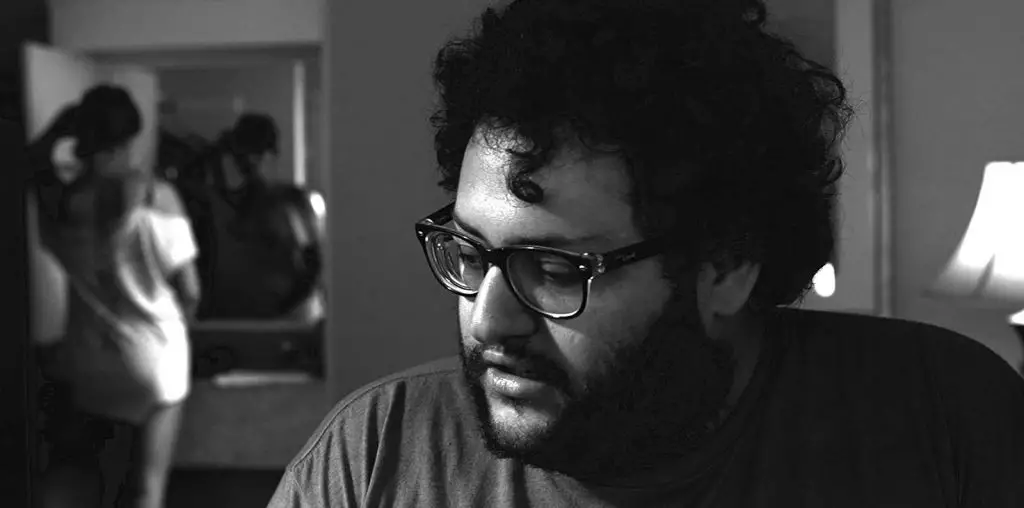
Bobbi Jene Smith uses her body as a brush for modern dance art she paints on a canvas of time, mass, and gravity.
Smith grew up in Iowa, studied dance at the Juilliard school, then in 2005 she left school and moved to Tel Aviv, Israel to join the Batsheva Dance Company. Director Elvira Lind’s documentary Bobbi Jene follows Smith’s life as she is deciding to return home to the US.
Describing her early days with Batsheva, Smith speaks of how the director of the troupe, Ohad Naharin, taught her about pain and pleasure in dance and sex when she was 21. He was in his 50’s at that time. I’m going to leave that right there.
Smith is supremely confident when performing, absolutely sure of herself and her mastery of her body, but the rest of the time she seems off-axis, nervous, and trying perhaps to convince herself as well as everyone else that leaving Batsheva is the right thing. Batsheva troupe members fail to hide their condescension as they reluctantly agree with her that she must find her own way but under that affirmation is a smirk that says “without Batsheva, who are you?” Precisely the question she wants to answer for herself.
She’s staring down the spectre of time and mortality, a much more immediate presence in the life of a dancer, coming much faster when your passion depends on muscles, joints, and tendons responding precisely at speed under command. At 30 Smith’s career as dancer might be waning, but she has mileage: she had already achieved success and lived through crazy cycles of life when most of us are still trying to figure out which direction is up.

“…a rare glimpse into a life in the world of dance most of us will never know.”
Smith’s decision is complicated by her relationship with a younger dancer, Or Schreiber, as she tries to convince him to go with her. With 10 years on him, the power dynamic has her in the lead because of the age difference and her experience, but he is steeped in the machismo of being an Israeli man and it’s clear he chafes at not being dominant. It’s also clear that he’s not coming to America but she makes the maximum effort to convince him. He explains to her his desire to raise a family in Israel, not to mention the family pressure on him to stay and live a more traditional Israeli life.
Bobbi Jene is very comfortable with her body. Whether specific to dance or just to Smith is unclear, but dancing and training are very sexualized for her. While all dancers are exhibitionists to some extent she seems to have turned a natural tendency into a successful life in art. Perhaps, on the other hand, I’m projecting my own inhibitions and body shame onto someone who has neither. When she presents her proposal for a piece to the Israeli Museum in Jerusalem she performs nude which makes the moment incredibly intimate.
Once she’s moved, life in California is not what she’d become accustomed to in Israel and of course she misses Or and struggles without him. He visits her, which only serves to make things worse. She admits “We’re not very good with all the reality stuff.”
Her life is by turns joyful, sweet, and sad. She’s delicate. It would be easy to dismiss her passion for art and the childlike emotional life of the dancers as superficial, but that would be a mistake. Smith has issues she’s dealt with and still dealing with that she works through successfully with dance.

“Lind has artfully created a portrait of a crucial moment in a dancer’s life.”
Lind got in close to Smith: she shot her nude working out and dancing and she captured on-camera moments with Smith telling her family of her decision to come home as well as dinner with Naharin when she told him she was leaving Israel.
Having never been to Israel, my concept of it was a jumble of scenes from old holy land bible parables, scud missiles falling, wailing walls and clashes in Gaza, but Lind reveals Tel Aviv to be alive, progressive, beautiful, and exciting. The film’s pace is slow: watch it when you are feeling patient. The soundtrack guitar is nicely done, and the cinematography is also solid.
Fans steeped in the world of modern dance will probably find nothing revelatory here, but for those of us who are strangers to it Lind has artfully created a portrait of a crucial moment in a dancer’s life.

Bobbi Jene (2017) Directed by Elvira Lind. Written by Maja Jul Larsen. Starring Or Schraiber, Bobbi Jene Smith.
7 out of 10


